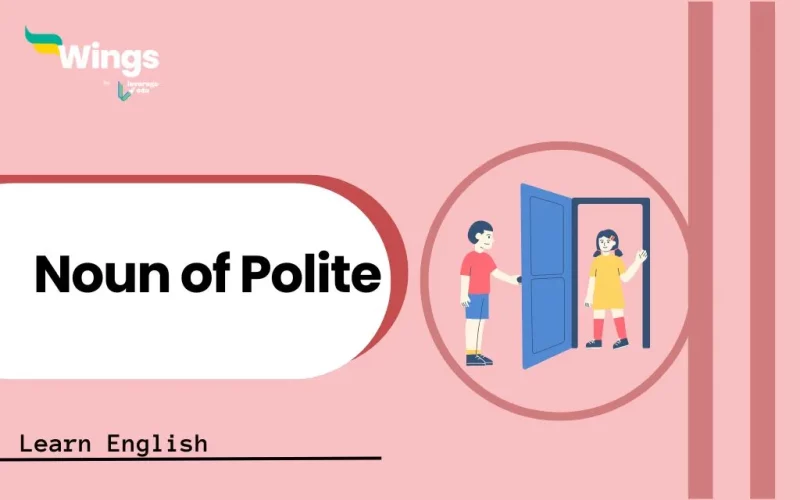The word “polite” is an adjective that describes someone who is respectful and has good manners. But if you want to turn “polite” into a noun, you use the word “politeness.” Politeness is the quality or state of being polite. For example, in the sentence Her politeness made a great impression on everyone,” “politeness” is the noun. This blog will explore the meaning of “politeness,” provide examples of how to use it in sentences, and give you more insights into this important word.
This Blog Includes:
Also read: What are Nouns? Check Definition, Types & Examples
What is the Noun for Polite?
The noun form of “polite” is politeness. Politeness refers to the quality of being polite. It encompasses behaviours, attitudes, and language that demonstrate respect, courtesy, and consideration for others. For example:
- Her politeness made a positive impression on everyone at the meeting.
- Politeness is essential in maintaining good relationships.
- The teacher praised the students for their politeness during the presentation.
Also Read: What is the Noun Form of Signify?
Origin of Noun of Polite
The word “polite” comes from the Latin polītus, the past participle of the verb polīre, meaning “to polish” or “to smooth”. This Latin root conveys the idea of refinement and smoothness, which is metaphorically extended to social behaviour.
Also Read: What is Noun for Provide
Words that Mean Polite: A Guide to Synonyms
This section will introduce you to these and other synonyms for polite, helping you expand your vocabulary and communicate more effectively in various situations.

| Synonyms of Polite | |
| Ladylike | Tactful |
| Deferential | Well behaved |
| Well-bred | Gentlemanly |
| Courteous | Respectful |
| Well mannered | Civil |
| Chivalrous | Gallant |
| Genteel | Cultivated |
| Gracious | Urbane |
Also Read: Noun Starting with C
Examples of Noun for Polite Sentences
- Her politeness made everyone feel welcome at the party.
- Politeness is important in maintaining good relationships with others.
- He was praised for his politeness during the interview.
- The teacher emphasised the value of politeness in the classroom.
- In many cultures, politeness is seen as a sign of respect.
- Her politeness towards strangers reflects her kind nature.
- In business, politeness can greatly influence negotiations and partnerships.
- The child’s politeness impressed the adults at the gathering.
- Politeness in communication can help prevent misunderstandings.
- He learned the importance of politeness from his parents at a young age.
Read more: List of Proper Nouns A-Z: Examples
Noun Quiz for Polite
Instruction: Choose the correct one from the given options below:
- What is the noun form of “polite”?
A) Politeness
B) Politeful
C) Politeness
D) Politen
Answer: A) Politeness
- Which of the following is a synonym for “politeness”?
A) Rudeness
B) Courtesy
C) Anger
D) Indifference
Answer: B) Courtesy
- In which sentence is “politeness” used correctly?
A) His politeness was appreciated by everyone.
B) She showed politeness by being rude.
C) Politeness is not important in communication.
D) They ignored his politeness completely.
Answer: A) His politeness was appreciated by everyone.
- What does “politeness” primarily refer to?
A) The act of being loud
B) The quality of being courteous
C) The state of being angry
D) The act of ignoring others
Answer: B) The quality of being courteous
- Which of the following sentences does NOT illustrate politeness?
A) “Please pass the salt.”
B) “Get out of my way!”
C) “Thank you for your help.”
D) “Would you mind closing the door?”
Answer: B) “Get out of my way!”
- Politeness can help in which of the following situations?
A) Conflict resolution
B) Ignoring someone
C) Being dismissive
D) Creating misunderstandings
Answer: A) Conflict resolution
- Which of the following is an example of politeness?
A) Interrupting someone while they are speaking
B) Listening attentively when someone is talking
C) Yelling at a friend
D) Making fun of others
Answer: B) Listening attentively when someone is talking
- What is the opposite of “politeness”?
A) Kindness
B) Rudeness
C) Respect
D) Gratitude
Answer: B) Rudeness
- Which phrase best describes “politeness” in a professional setting?
A) Being indifferent to coworkers
B) Using respectful language and behaviour
C) Ignoring workplace etiquette
D) Being overly critical of others
Answer: B) Using respectful language and behaviour
- Which of the following best illustrates the importance of politeness?
A) It can lead to better relationships and communication.
B) It is irrelevant in modern society.
C) It creates barriers between people.
D) It is only necessary in formal situations.
Answer: A) It can lead to better relationships and communication.
Check more blogs on Noun!
We hope this blog has provided you with all the necessary information on what is the noun of polite. To advance your grammar knowledge and read more informative blogs, check out our Learn English page and don’t forget to follow Leverage Edu.
 One app for all your study abroad needs
One app for all your study abroad needs














 45,000+ students realised their study abroad dream with us. Take the first step today.
45,000+ students realised their study abroad dream with us. Take the first step today.

